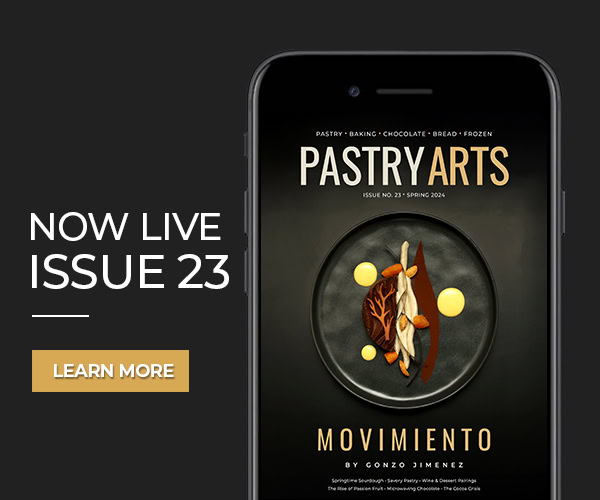(This article appeared in the Spring 2019 issue of Pastry Arts Magazine)
From working at the legendary Stars in San Francisco to authoring several books, co-hosting a PBS show, appearing on several television programs, and receiving industry awards such as the James Beard Foundation’s Who’s Who of Food & Beverage in America, Emily Luchetti has helped to define what great pastry means in America. Her secret? Combining passion and tenacity with a healthy dose of curiosity. Because passion, as she says, can disappear rather quickly when you have 400 sugar flowers to make. In our interview, Luchetti shares a bit of her professional journey, and provides advice for young professionals today about getting over mistakes, the danger of social media in today’s climate, and planning for a long-term career.
First, what was it like working at the legendary Stars Restaurant with Jeremiah Tower?
 Jeremiah is a bit of an enigma. On the one hand, he can be extremely difficult, but on the other hand he’s extremely charming, has a great sense of humor, and his palate is impeccable. Stars was life-changing for everybody who worked there.
Jeremiah is a bit of an enigma. On the one hand, he can be extremely difficult, but on the other hand he’s extremely charming, has a great sense of humor, and his palate is impeccable. Stars was life-changing for everybody who worked there.
One of the most remarkable things was when Jeremiah opened it. No one knew if it was going to take off or what it was going to be because no one had seen anything like that before. We were in unchartered waters. Then, when we opened, and everything took off the way it did, it changed the country as far as how people looked at food. It was a very, very magical place to be.
With all the success you’ve had thus far, when you look back, what helped you get to where you are today?
To be successful, you have to have a combination of tenacity and passion. You can have a passion for making cakes, but when you’ve got 400 sugar flowers to make, the passion disappears quickly, and tenacity has to slip in and take over. The balance of tenacity and passion gets you through the different parts of your day and career.
Staying curious is a big part; and the willingness to do hard work day-in and day-out. It’s a creative journey as well as a practical journey. So, it’s keeping both of those things alive at the same time.
Also, I’m more competitive with myself than with other people. If I see someone do something in the dessert world I find amazing, I get excited and want to promote them because I’m a firm believer that everybody can win. Everybody wants to be the best, but there are so many different ways to do things. I’m competitive with myself and want to keep doing new and different things, whether it’s creating new desserts, pastries, or dessert related experiences.
Many pastry chefs or professionals want to “do their own thing” or “their own desserts” instead of “working for someone,” what are your thoughts on this? Was this something you wrestled with personally?
 You’re [either] going to be told what to do by the boss of a restaurant or if you’re on your own, your customers are going to tell you what they want. First, you need to stay true to yourself and what your style of food is, but at the same time, you need to be practical. I always give a creme brulee analogy. Pastry chefs say creme brulee’s are boring and uncreative, and my attitude is they’re low food cost, easy to make, and the customer loves them. So, what’s wrong with that picture? Maybe it’s not the most creative thing that you’re doing, but it checks a lot of boxes.
You’re [either] going to be told what to do by the boss of a restaurant or if you’re on your own, your customers are going to tell you what they want. First, you need to stay true to yourself and what your style of food is, but at the same time, you need to be practical. I always give a creme brulee analogy. Pastry chefs say creme brulee’s are boring and uncreative, and my attitude is they’re low food cost, easy to make, and the customer loves them. So, what’s wrong with that picture? Maybe it’s not the most creative thing that you’re doing, but it checks a lot of boxes.
If you’re selling out your soul and doing something that is totally against who you are as a person, [that is one thing], but you also have to be practical in the fact that you want to make a living. You’re going to have to bend the rules a little and ask what are you being so principled on that it’s kind of silly? To a certain extent, we should all say it’s just food. Be very true to it and take it very seriously, but just be a little bit more pragmatic.
Another example is a lot of people who start a bakery say they’re not going to do soups and sandwiches, just desserts and pastries, but three months in they start selling soups and sandwiches. Why? Because it helps their bottom line immensely. It gets people in the door at another time besides when they’re looking for something sweet, and if they’re in for a sandwich or soup, it could boost dessert sales. So, I think you have to be openminded. But again, if someone’s asking you to sell your soul to do something, quit and go work somewhere else. But the thing that you can run your own business and you’re not going to have other people tell you what to do is a fallacy.
What helped you develop your own unique style?
My personality kind of matches my food style; I’m more understated – I dress simple, a little classic and I’m down to earth. It evolved [in San Francisco], and I was very fortunate to be at Stars where everything came together. It felt very natural to me.
People often ask how to match desserts with a menu, and I tell them if they understand the overall ethos of the chef, restaurant, and culture, it’s not forced. You don’t have to think about it. Every time I do something, I just create things that naturally fit. Some of that is choosing to work with people where there’s a commonality.
What fundamentals have been vital to your success?
 You can’t make much without folding, whipping and beating [laughs].
You can’t make much without folding, whipping and beating [laughs].
It’s a discipline for hard work and the appreciation of hard work. Nothing comes easy. There are days you wake up, and you’re so tired you don’t want to go in, but you go. Because if you want it, you have to work for it, and it makes it that much sweeter when you get it.
It’s also being open to new ideas and not doing everything the same way. There are many techniques people can use, but when you switch something around, it can suddenly come out better – like making a caramel sauce, and instead of adding cream in the end, you add rum or something. With desserts it’s scientific, and there are certain ways you have to bake, but you can learn the rules and then discover which rules you can bend, which rules can be broken, and which ones you can’t mess with at all.
There are techniques you learn in the beginning that you will get better with over time, but at the same time, there’s always the ability to bend rules, and it’s something that’s a lifelong experience. Because not only can you figure it out your own way, but someone else will too, and once you see another pastry chef do it a different way, you can adapt to that.
What are some of the trends you see right now that are standing out to you?
There are so many different styles that are successful at the same time. When I started, everything was in restaurants, and now it’s a combination of restaurants, bakeries, food products, etc., and I find that breadth is really good.
I am concerned that it seems very few people want to work in restaurants anymore, and the other problem with that is they want to own a business – bakery, make cakes – but a lot of people fail because of the margins and how expensive it is to run a business. Also, restaurants have scaled down on the size of the pastry departments which is very discouraging.
I’m also very happy that you can find quality on all different levels now. It’s more about quality because we all can’t eat dessert all the time. So, everyone’s saying, we know we’re not going to give them up, so let’s make sure whatever we eat is really good quality.
Something you started was #dessertworthy, a movement to empower people to be more mindful of their sugar and fat indulgences; can you share the inspiration for this?
As a society we aren’t going to get people to stop eating desserts, nor do I firmly believe that they should on many levels – primary because I’m a pastry chef [laughs]. Desserts play a really important role. If you put a bunch of people around the table with a really good Tiramisu – or whatever it is – the whole experience is heightened. Over a lifetime, you get a lot of those little experiences, and they’re instrumental. One Tiramisu isn’t going to do it, but 30 Tiramisu’s over the years does. I really feel there’s a place for it, but I think we need to control it.
Now, if you were starting fresh in the industry today, what advice would you give yourself?
 Don’t beat yourself up for the things that didn’t work or for the reviews you got that weren’t great. Also, you have to be careful not to let the drudgery and hard work of it all overwhelm the bigger picture and the passion. It’s really important to constantly keep yourself mentally engaged and invigorated.
Don’t beat yourself up for the things that didn’t work or for the reviews you got that weren’t great. Also, you have to be careful not to let the drudgery and hard work of it all overwhelm the bigger picture and the passion. It’s really important to constantly keep yourself mentally engaged and invigorated.
There were a few years where I said to myself, “Should I have gone straight to pastry instead of doing seven years in savory? Did I waste that time?” But I really didn’t think that I did because I learned how to work the line amazingly, so you can take that speed and accuracy into the pastry kitchen, and I also learned a palate that I think is very helpful in pastry. Having both sides of the kitchen was really helpful for me.
 What advice would you give to the pastry and baking professionals in the industry today?
What advice would you give to the pastry and baking professionals in the industry today?
Be careful of social media. I think it plays a big role, and it’s an important [tool] to promote yourself, but don’t look constantly at what other people are doing stylistically or what they have on their menus to the point where it doesn’t allow you to look internally. You have to look both outward for inspiration and inside. So, you have to turn off those external sources to get back to what you want to do and what you want to express.
It’s really easy in this day and age to turn off the internal because it’s never really turned on. And then you might miss some really creative opportunities. Sometimes, the way creativity works is you have stuff in your head and it just turns around like in a mixing bowl and then all of a sudden something comes out and you have to just give things time to kind of shuffle and mix together. So, don’t be constantly on the go that you don’t give yourself enough time for reflection. And downtime is as important as anything because it allows everything to process.
You have to look ahead at what you want to do because you can’t be 60 years old and working behind the counter doing production 14 hours a day. Your body just won’t let you do that. When you’re younger, and as you go through your career, you have to start looking at the totality and the longevity of what your role is going to be and how you fit in. Also, allow yourself to evolve as you move through your career, and be open to different kinds of things.
Photo Credits: Michael Lamotte, Aubrie Pick, Sheri Giblin





You must be logged in to post a comment.